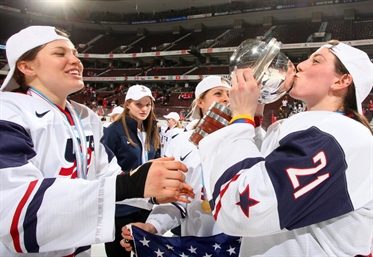WW Top 25 Stories: #18
WW Top 25 Stories: #18
Visitors win twice in North American finals

 Team USA players celebrate with the trophy after winning the 2013 IIHF Ice Hockey Women’s World Championship across the border in Ottawa. Photo: Andre Ringuette / HHOF-IIHF Images
Team USA players celebrate with the trophy after winning the 2013 IIHF Ice Hockey Women’s World Championship across the border in Ottawa. Photo: Andre Ringuette / HHOF-IIHF Images
It marked only the third time the U.S. had hosted, and the first time since 2001. USA Hockey did a sensational job in identifying a city – Burlington, Vermont – that provided the perfect atmosphere for the tournament.
In fact, Alicia Mihalikova of the Slovak team attended Rice Memorial high school in Burlington and had a nice local following. Burlington was also a university town – think young, hip, enthusiastic – and with tickets reasonably priced, the event was so well attended USA Hockey immediately considered coming back for more IIHF hockey at a later date.
The 2012 tournament also marked a change in format. Instead of dividing the top eight teams into two even groups, the IIHF used a “vertical” system whereby the top-four teams played in Group A and teams seeded 5-8 played in Group B.
The top-two teams in Group A qualified directly to the semi-finals, and the third and fourth Group A teams played the top two from Group B in quarter-finals. The new scheduling produced closer games and provided greater drama.
But, ironically, one of the more lop-sided games came on opening night when the hosts faced Canada in the round-robin preliminary round. Everything the Americans touched turned to gold, and Canada could do no right. The 9-2 score was the worst loss ever for Canada, which seemed slower, less skilled, and less confident than their rivals.
Of course, the crowd went berserk every time the U.S. scored, and although it seemed likely the teams would meet again for gold, the home side were clear favourites.
Continue readingThat gold-medal game, just one week later, was a thriller from start to finish. When Canada scored early in the opening period, everyone knew this was a different – and more motivated – team from seven days’ previous.
The Americans tied the game, but Canada went up 3-1. Again, the U.S. stormed back to tie it, 3-3. The Americans took their first lead, 4-3, early in the third, but Canada tied the game late to send it to overtime. In the fourth period, Caroline Ouellette notched the winner, and Canada somehow earned gold. That 9-2 pasting went a long way to the win, and Burlington’s many U.S. fans had to settle for silver.
One year later, Ottawa played host, same format, same feeling. Canada was now the favourites, and in the first game the home side eked out a dramatic 3-2 win in a shootout. Again, a week later, the teams faced off for gold.
Canada scored the only goal of the first period, but the Americans took a 2-1 lead by the midway point of the game only to see Canada tie it 2-2 before the end of the second.
Amanda Kessel, in the midst of a sensational season, in which she could rightly claim title to world’s best female player, scored early in the third, and Canada could not tie the game this time. For the second year in a row, two incredible finals saw the visiting team crush the cheers of the home fans, the North American rivalry at its peak, the dismay of losing overcome by the pride of recovering and winning.
“I feel like it’s revenge," Kessel said in the celebration after the game. "We got beat on our home soil last year. To come into Canada and win the gold medal is unbelievable. We used our speed and worked hard.”
It may be a long time before women’s hockey sees back-to-back championships played in two exceptional venues with gold-medal games of this quality.
In celebration of the 25th anniversary of women's hockey in the IIHF, writer Andrew Podnieks is counting down the top 25 stories in women's international hockey history. One story each day will appear until the Number 1 story is unveiled the morning of the gold-medal game of the 2015 Women's Worlds in Malmo, Sweden, on April 4.
Earlier Top 25 Stories:
#19: IIHF makes Women’s Worlds official for 1990
#20: Rogge issues challenge to women’s hockey
#21: IIHF goes to all-women officials
#22: Shannon Miller recruits Euros for NCAA
#23: IIHF introduces junior event for women
#24: Zorn a goalie and skater both
#25: Russia-Switzerland a dandy display in 2011
Back to Overview























































